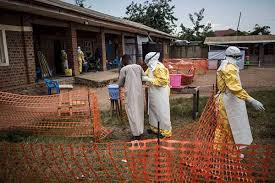After the outbreak of Ebola virus in the Democratic Republic of Congo (DRC) and Guinea, six countries are on “urgent alert.”
Through this measure, the World Health Organization (WHO) wants to avoid the specter of another epidemic crisis.
“We have already alerted the six neighboring countries, including of course Sierra Leone and Liberia (for Guinea), and they are very busy preparing and getting ready to look for any potential infection,” said on Tuesday, Margaret Harris, WHO’s Spokesperson, during a virtual press conference from Geneva.
However, she did not specify other countries besides Sierra Leone and Liberia.
The DR Congo borders eight countries: Angola, Burundi, Uganda, the Central African Republic, the Republic of Congo, Rwanda, South Sudan and Zambia. For its part, Guinea has five land borders with Cote d’Ivoire, Guinea-Bissau, Mali, Senegal, as well as Liberia and Sierra Leone, its two closest countries.
According to the World Health Organization (WTO), within days of each other, cases of Ebola virus infection reappeared in the DRC and Guinea. Guinea has ten suspected cases and three people have already died from the virus since the start of this new epidemic.
“We now know that there are 7 cases (3 confirmed, 4 probable) in Guinea and that 3 of them have died,” the WTO Spokesperson said, adding: “We have identified 115 contacts and the majority of them, 109, have been found. The contact cases are in Nzerekore (south-east of the country) but also in Conakry, the Guinean capital.”
WHO is supporting Guinea in setting up treatment infrastructure to trace contacts and speed up the response to the outbreak.
On the eastern side of the DRC, the UN World Health Agency has already identified 300 contacts.
“We also have an ongoing epidemic in the North Kivu, but there is no connection between the two. We saw no evidence of any connections. But they continue at the same time,” Dr Harris said.
Though the DRC and Guinea are several thousand kilometers apart, which excludes out of hand, any links between these concomitant events, the return of Ebola has caused concern, especially in West Africa.
“The epidemics in Guinea and the Democratic Republic of the Congo are completely independent, but we are facing similar challenges in both cases,” Dr. Tedros, the Director-General of the WHO said on Monday, at his bi-weekly teleconference.
Causing a sudden fever, headaches, vomiting and diarrhea, the Ebola virus was first identified in 1976 in former Zaire, now DRC. The 11th epidemic in the country, which killed 55 out of 130 cases in the northwestern province of Equateur, was declared on November 18, 2020.
The Guinean epidemic that started in the ‘Guinee Forestiere’ region in December 2013, then spread to neighboring Liberia and Sierra Leone. It ended in 2016, causing more than 28,000 cases, including over 11,000 deaths.
TE/fss/abj/APA


